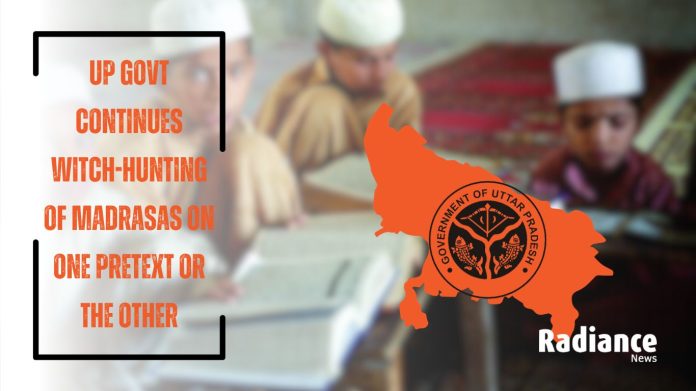The state Madrasa Education Board accused the ruling party of engaging in cheap politics under the guise of an investigation into madrasa managements

By Abdul Bari Masoud
It appears that the Uttar Pradesh government, led by Chief Minister Yogi Adityanath, wants to keep the polarization plank alive for the upcoming general elections in 2024. As a result, the Madrasa system has become a soft target in the state. Following a survey of madrasas last year, the Yogi government has now set up a three-member Special Investigation Team (SIT) under the Additional Director General to investigate the foreign funding of madrasas in the state. Before the announcement of SIT, the state’s Basic Education Department served notices to madrasas in districts like Muzaffarnagar, Bahraich, Fatehpur, Kaushambi, etc.
Terming these actions of the administration as ‘witch-hunting’ policies against madrasas, madrasa managers and community organizations said there has been a great deal of outrage over them. Even the state Madrasa Education Board also accused the ruling party of engaging in cheap politics under the guise of an investigation into madrasa managements.
The UP Board of Madrasa Education recognizes more than 16,500 of the approximately 25,000 madrasas in Uttar Pradesh.
“We will examine the accounts of madrasas that are getting funding from overseas during the investigation. We’ll watch the expenditure of the funds obtained through overseas funding. Is the money used for any other purposes, such as operating the madrasas?” said Mohit Agarwal, Additional Director General, ATS, who is in-charge of the investigation. The superintendent of police for the Cyber Cell, Reebha, and the director of the Minority Welfare Department, Triveni Singh, make up the other two members of the SIT.
According to a senior official in Lucknow, about 4,000 madrasas in the state are under the scanner for receiving foreign funds. The probe would focus more on madrasas operating in border territories between India and Nepal.
According to Agarwal, the administration has not yet specified a deadline for wrapping up the investigation. The probe will include both registered and unregistered madrasas.
The government had earlier this year, in January, directed district magistrates of the districts that border Nepal to look into the financing sources of unrecognized madrasas that listed contributions and zakat (charity money) as their main sources of income.
Dharmpal Singh, the Cabinet Minister for Minority Welfare and Muslim Waqf, stated that zakat and donations are the main sources of funding for a number of madrasas in the regions bordering Nepal. However, survey teams discovered that the residents of these places are impoverished and unable to make donations or offer zakat. These madrasas have been discovered, and instructions have been given to double-check their financing source. The identities of the people who provide money for these madrasas were not disclosed.
According to Javed, there was a significant controversy during the inquiry into madrasas eleven months prior, and some politicians and government officials even opposed the investigation’s inclusion of Islamic seminaries.
Eleven months have gone by since the Madrasas’ functional investigation was carried out. How is the report doing? Was it introduced to the Assembly or made available to the general public? If not, who disseminated the false information about madrasa funding from abroad? asked Javed.
Meanwhile, Uttar Pradesh’s basic education department issued notices to over a dozen madrasas in Muzaffarnagar district that caused outrage across the state. The notice to these madrasas operating “without” proper registration asked them to produce their documents.
There were 25,000 madrasas in Uttar Pradesh, of which around 16,000 were recognized and 8,949 were unrecognized. Madrasa Board chairman said seven and a half lakh children study in the unrecognized madrasas.
The notice-issued madrasas have been ordered to present the necessary documentation within three days of the order being received, failing which they risk sanctions under the regulations.
“If the madrasas are found operating without recognition, they will be fined Rs. 10,000 per day,” the notice read.
According to Muzaffarnagar Basic Shiksha Adhikari (BSA) Shubham Shukla, the district minority department has informed his office that more than a hundred madrasas being run here do not have registration or recognition in the district and are functioning against the norms.
In a jab at the center, the Madrasa Board chairman said that although the government, led by Prime Minister Narendra Modi, has stated that it cares for ‘Pasmanda Muslims’, it has not given any thought to the future of the students enrolled in these madrasas that are not recognized. He stated that although madrasas were kept apart from the education department for 28 years starting in 1995, 12 madrasas in Muzaffarnagar have now received notifications.
The chairman also alleged that he was not consulted prior to the state government releasing its report on madrasas that were not recognized.
Maulana Aamir Rashadi Madni, rector of Jamiatur Rashad in Azamgarh, said the allegation of foreign funding is just like old wine in a new bottle. Speaking with Radiance, Rashadi said during the Vajpyee government, the then home minister, L.K. Advani had made it clear that the madrasas on the Nepal border side were not indulged in any activities that were detrimental to the country’s security. Rashadi, who is president of the Rashtriya Ulama Council, said that by bringing up this fictitious issue again, the ruling party is trying to divert attention from its failures.
Maulana Zakir Husain, secretary of the Uttar Pradesh unit of Jamiat Ulema-e-Hind, also said the madrasas in the state are “being harassed by serving them illegal notices only to target a particular community”.
“The madrasas are providing free education to the students; they will not be able to pay the fine of Rs. 10,000 per day,” Husain said.
Maulana Mufti Shahabuddin Rizvi Barelvi, president of All India Muslim Jamaat, echoed the same feelings when he stated that the madrasas had first been frightened in the name of a survey, then in the name of foreign money, and now they were being harassed by notices. According to him, the reason madrasas are operating all over India is because minorities have full constitutional rights to establish and manage madrasa institutions. The Uttar Pradesh Education Department’s notice to the madrassas violates the Constitution and will be contested in the Supreme Court.
He underlined that the Education Department only has the authority to grant recognition to madrasas and is not authorized to fine them Rs. 10,000. He said the Education Department is trying to intimidate madrasa committees to close down madrasas.
After much uproar, these notices were revoked.
Speaking with Radiance, the Rector of Madrasa Arabia Qasim-ul-Uloom at Masavi village in Muzaffarnagar district, Maulana Sajid Nomani, said the madrasa was established way back in 1982, and currently 550 students, mostly girls, are enrolled. He revealed that the Basic Education Department did not serve the notice directly to Madrasa management but through a neighboring school teacher, which shows the malice of the department. He further underlined that Madrasa is a registered institution, and it does an annual audit of its income and expenditure.




